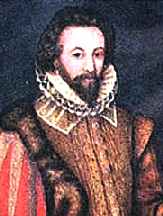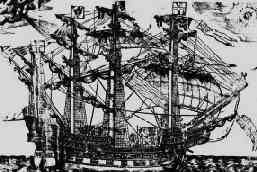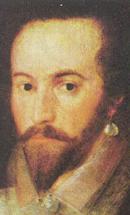|

Sir
Walter Raleigh
Raleigh (or
Ralegh) was an adventurer, courtier
to Elizabeth I, navigator, author, scientist and poet. Some
thought him a rogue, others thought him an
explorer and author of great vision. He was
born in Devon and fought with the Hugenot
in France at an early age. After a failed 'voyage
of discovery' (more likely a pirating expedition)
to Spain, he went to Ireland where he suppressed a
rebel uprising in Munster.
His father was a Devonshire gentleman of property, connected with many of the distinguished families of the south of England. Walter was born about 1552 and was educated at Oxford. He first saw military service in the Huguenot army in France in 1569, and in 1578 engaged, with his half-brother, Sir Humphrey Gilbert, in the first of his expeditions against the Spaniards.
After some service in Ireland, he attracted the attention of the Queen, and rapidly rose to the perilous position of her chief favorite. With her approval, he fitted out two expeditions for the colonization of Virginia, neither of which did his royal mistress permit him to lead in person, and neither of which succeeded in establishing a permanent settlement.
Raleigh returned to England to the court of
Elizabeth I, where he became a favorite of the
Virgin Queen. She lavished him with land, knighted
him and appointed him captain of the Queen's Guard
(1587), which kept him close to the Queen's side.
There is little to confirm the famous story of how he
spread his cloak across a puddle so that the Queen could
walk over it, except for the cloak included in his coat
of arms.
Raleigh was not popular with
everyone. It
is thought that Shakespeare's Love's Labors Lost
is a satire of Raleigh. Between 1584-89 he led an expedition to the New
World and unsuccessfully colonized Roanoke Island,
North Carolina and Virginia. He brought back
potatoes and tobacco to Britain, changing the face
of food and commerce at home.
After about six years of high favor, Raleigh found his position at court endangered by the rivalry of
the Earl of Essex,
Raleigh returned to Ireland in 1589 where he
tended his estates and nurtured poet Edmund
Spenser. In 1592, Raleigh returned to the court of
Elizabeth after a privateering mission to
Portugal. When the Queen discovered his secret
marriage to one of her maids of honor, Elizabeth 'Bessy'
Throckmorton, he was brought back to London and
thrown into the Tower.
On the death of Elizabeth, Raleigh's misfortunes increased. He was accused of treason against James I, condemned, reprieved, and imprisoned for twelve years, during which he wrote his "History of the World," and engaged in scientific researches. In 1616 he was liberated, to make another attempt to find the gold mine in Venezuela; but the expedition was disastrous, and, on his return, Raleigh was executed on the old charge in 1618. In his vices as in his virtues, Raleigh is a thorough representative of the great adventurers who laid the foundations of the British Empire.
In 1588 Raleigh
and Sir
Richard Grenville took over the joint defense
of Devon and Cornwall against the expected Spanish
Armada. They arranged the construction of a series of
beacons along the coasts. These were to be lit when the
Armada was first sighted. As it happened,
land-based soldiers did little but watch the sea battles
from the coast and guard some Spanish prisoners.
As governor of Jersey in 1600, he improved its
trade economy. Yet in 1603, Raleigh's enemies
convinced James I to arrest him under suspicion of
opposition to the King's succession. Reprieved
from a death sentence, he was sent to the Tower,
where he focused on historical writing and
scientific study. It was there that he wrote his
important, if incomplete, History of the World.
Raleigh
was released in 1616 to search for gold again in
the Orinoco, his expedition failed, and he
violated the terms of the mission by destroying a
Spanish town. He returned to England, where the
Spanish Ambassador to London asked the King to
reinstate Raleigh's death sentence. He was
beheaded at Whitehall.
THE
SPANISH ARMADA
Raleigh
arranged for the construction of one of the ships
involved in fighting the Armada. "The Ark
Royal" weighed 800 tons and was completed in 1587.
It had four masts and a normal crew of 270. The Treasury
was very short of money to finance a fleet to fight the
Armada. Thus Raleigh donated the ship in exchange for an
I.O.U. of £5,000. The "Ark Royal" was chosen
to lead the English fleet against the Armada
in 1588. It was rebuilt in 1608 and renamed "Anne
Royal". It was finally sunk due to an accident, in
1636.
There have been four further Ark Royals since then. The
following links have details of the versions -
-
more
about the first
Ark Royal 1587 to 1636
-
the
second Ark Royal 1914 to
1934
-
the
third
Ark royal 1937 to
1941
-
the
fourth
Ark Royal 1950 to
1978
-
more
about the fifth
Ark Royal from 1981

The
Ark Royal - 1587 - 1636
If
you want to see a reconstruction of a similar (but
smaller) vessel, Drake's
(more
on Drake) "Golden
Hinde" is berthed in London.
RALEIGH'S
(OWN ACCOUNT) DISCOVERY OF GUIANA
The Discovery of the large, rich, and beautiful EMPIRE Of GUIANA;
a Relation of the great and golden CITY of MANOA, which the Spaniards
call EL DORADO, and the PROVINCES of EMERIA, AROMAIA, AMAPAIA, and
other Countries, with their rivers adjoining. Performed in the year
1595 by Sir WALTER RALEIGH, KNIGHT, CAPTAIN of her Majesty's GUARD,
Lord Warden of the STANNARIES, and her Highness' LIEUTENANT-GENERAL of
the COUNTY of CORNWALL.
The empire of Guiana is directly east from Peru towards the sea, and
lieth under the equinoctial line; and it hath more abundance of gold
than any part of Peru, and as many or more great cities than ever Peru
had when it flourished most. It is governed by the same laws, and the
emperor and people observe the same religion, and the same form and
policies in government as were used in Peru, not differing in any
part. And I (Raleigh) have been assured by such of the Spaniards as have seen
Manoa, the imperial city of Guiana, which the Spaniards call El
Dorado, that for the greatness, for the riches, and for the excellent
seat, it far exceedeth any of the world, at least of so much of the
world as is known to the Spanish nation. It is founded upon a lake of
salt water of 200 leagues long, like unto Mare Caspium.
This very year (1595) there were seventeen sail of Spanish ships lost
in the channel of Bahama, and the great Philip, like to have sunk at
the Bermudas, was put back to St. Juan de Puerto Rico; and so it
falleth out in that navigation every year for the most part. Which in
this voyage are not to be feared; for the time of year to leave
England is best in July, and the summer in Guiana is in October,
November, December, January, February, and March, and then the ships
may depart thence in April, and so return again into England in June.
So as they shall never be subject to winter weather, either coming,
going, or staying there: which, for my part, I take to be one of the
greatest comforts and encouragements that can be thought on, having,
as I have done, tasted in this voyage by the West Indies so many
calms, so much heat, such outrageous gusts, such weather, and contrary
winds.
To conclude, Guiana is a country that hath yet her maidenhead, never
sacked, turned, nor wrought; the face of the earth hath not been torn,
nor the virtue and salt of the soil spent by manurance. The graves
have not been opened for gold, the mines not broken with sledges, nor
their images pulled down out of their temples. It hath never been
entered by any army of strength, and never conquered or possessed by
any Christian prince. It is besides so defensible, that if two forts
be builded in one of the provinces which I have seen, the flood
setteth in so near the bank, where the channel also lieth, that no
ship can pass up but within a pike's length of the artillery, first of
the one, and afterwards of the other. Which two forts will be a
sufficient guard both to the empire of Inga, and to an hundred other
several kingdoms, lying within the said river, even to the city of
Quito in Peru.
There is therefore great difference between the easiness of the
conquest of Guiana, and the defence of it being conquered, and the
West or East Indies. Guiana hath but one entrance by the sea, if it
hath that, for any vessels of burden. So as whosoever shall first
possess it, it shall be found unaccessible for any enemy, except he
come in wherries, barges, or canoas, or else in flat-bottomed boats;
and if he do offer to enter it in that manner, the woods are so thick
200 miles together upon the rivers of such entrance, as a mouse cannot
sit in a boat unhit from the bank. The West Indies have many ports, watering places, and landings; and nearer
than 300 miles to Guiana, no man can harbour a ship, except he know
one only place, which is not learned in haste, and which I will
undertake there is not any one of my companies that knoweth, whosoever
hearkened most after it.
Besides, by keeping one good fort, or building one town of strength,the whole empire is guarded; and whatsoever companies shall be
afterwards planted within the land, although in twenty several
provinces, those shall be able all to reunite themselves upon any
occasion either by the way of one river, or be able to march by land
without either wood, bog, or mountain. Whereas in the West Indies
there are few towns or provinces that can succour or relieve one the
other by land or sea. By land the countries are either desert,
mountainous, or strong enemies. By sea, if any man invade to the
eastward, those to the west cannot in many months turn against the
breeze and eastern wind. Besides, the Spaniards are therein so
dispersed as they are nowhere strong, but in Nueva Espana only; the
sharp mountains, the thorns, and poisoned prickles, the sandy and deep
ways in the valleys, the smothering heat and air, and want of water in
other places are their only and best defence; which, because those
nations that invade them are not victualled or provided to stay,
neither have any place to friend adjoining, do serve them instead of
good arms and great multitudes.
The West Indies were first offered her Majesty's grandfather by
Columbus, a stranger, in whom there might be doubt of deceit; and
besides it was then thought incredible that there were such and so
many lands and regions never written of before. This Empire is made
known to her Majesty by her own vassal, and by him that oweth to her
more duty than an ordinary subject; so that it shall ill sort with the
many graces and benefits which I have received to abuse her Highness,
either with fables or imaginations. The country is already discovered,
many nations won to her Majesty's love and obedience, and those
Spaniards which have latest and longest laboured about
the conquest, beaten out, discouraged, and disgraced, which among these nations were
thought invincible. Her Majesty may in this enterprise employ all
those soldiers and gentlemen that are younger brethren, and all
captains and chieftains that want employment, and the charge will be
only the first setting out in victualling and arming them; for after
the first or second year I doubt not but to see in London a
Contractation-House (the whole trade of Spanish America passed through
the Casa de Contratacion at Seville) of more receipt for Guiana than
there is now in Seville for the West Indies.
I
(Raleigh) am resolved that if there were but a small army afoot in Guiana,
marching towards Manoa, the chief city of Inga, he would yield to her
Majesty by composition so many hundred thousand pounds yearly as
should both defend all enemies abroad, and defray all expenses at
home; and that he would besides pay a garrison of three or four
thousand soldiers very royally to defend him against other nations.
For he cannot but know how his predecessors, yea, how his own great
uncles, Guascar and Atabalipa, sons to Guiana-Capac, emperor of Peru,
were, while they contended for the empire, beaten out by the
Spaniards, and that both of late years and ever since the said
conquest, the Spaniards have sought the passages and entry of his
country; and of their cruelties used to the borderers he cannot be
ignorant. In which respects no doubt but he will be brought to tribute
with great gladness; if not, he hath neither shot nor iron weapon in
all his empire, and therefore may easily be conquered.

SIR
WALTER RALEIGH - LINKS
Quotes
Life
of Sir Walter Ralegh
Works
of Sir Walter Ralegh
Essays
& Articles
Additional
Sources
Ralegh
at the Bookstore
Reigns of English Monarchs around Raleigh's time
-
1509
to 1547 - Henry VIII
1547
to 1553 - Edward VI (son of Henry)
1553
to 1558 - Mary I (daughter of Henry)
1558
to 1603 - Elizabeth I (daughter of Henry)
1603
to 1625 - James I (also James VI of Scotland)
CONTACT:
nelson@solarnavigator.net
07905 147709 (UK)
|